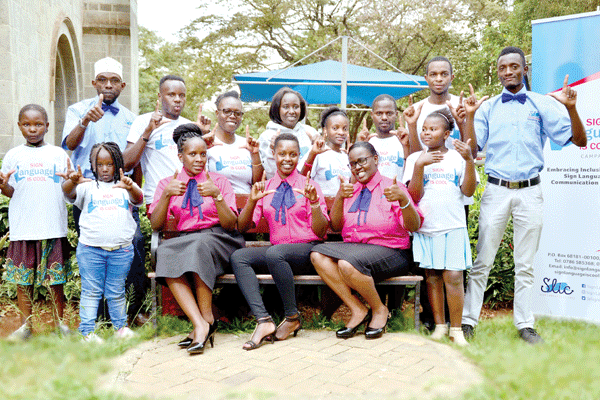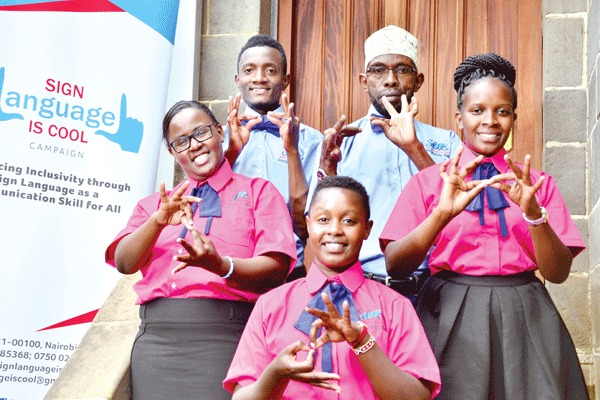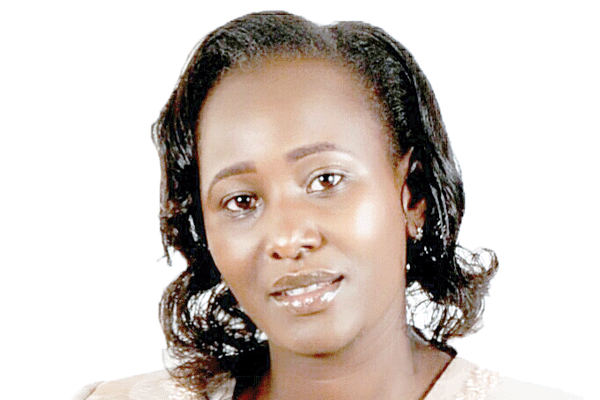Teaching abled Kenyans how to sign

Majority of Kenyans see disability as physical, yet there is more to it. Invisible disability, such as deafness, makes it hard for the inclusion of hearing impaired individuals, because of the negative attitudes and beliefs against people with disabilities (PWDs).
It is against this background that Diana Wambui-Kamau made it her mission to find a solution to make the persons with hearing and speaking disabilities to be included in the society.
As the founder and coordinator Sign Language Is Cool (SLIC), she wants to influence able-bodied people by modifying their beliefs, values and attitudes towards the PWDs, more so, the deaf and dumb.
Negative mindset
“I noticed and experienced first-hand the kind of challenges faced by PWDs in terms of discrimination and stigma. I realised abled people were willing to interact with them, but did not know how to,” she says.
For her, sign language was a great step to get rid of the negative mindset and attitudes. She chose to introduce it as a cool language and as a communication skill.
“That is how the SLIC was launched. Our campaign works towards embracing inclusivity through sign language. We offer several services including Sign Language Customised Training, SLIC Interpretation Services, SLIC Clubs in schools, including institutions of higher learning and in communities,” Diana says.
Other services include trainings and consultation in inclusive communication strategy and audits.
“All our services lean towards inclusion. We ensure there is acceptance of PWDs. It has not only impacted the lives of the deaf, but all the other disabilities too into accessing available opportunities,” she said.

Diana hopes that through SLIC, organisations and companies will be prompted to find ways to be more inclusive and fulfill the five per cent threshold of employing PWDS.
Interest in learning
The SLIC platform has gradually changed people’s and organisations’ mindset.
“We have had people come on board to support us, and their attitude towards PWDs drastically change through the basic, interactive and conversational sign language skills and inclusion awareness trainings,” an excited Diana smiled.
Over time, more people acknowledge sign language is cool and want to learn more.
The introduction of SLIC clubs in schools is something Diana is also proud of.
The clubs expose pupils to peoples or children living with different disabilities and by this, their world becomes more inclusive.
It helps deal with discrimination and stigma from a young age as well as ensure sustainability of the language and interactions with PWDS.

Even then, it has not been a walk in the park. “A huge chunk of hurdles we face include the mindset and attitude from people we come across.
The moment sign language is mentioned, minds immediately go to the deaf and dumb community and so, not many see the need to learn it,” Diana points out.
Because of the mindset, it has been challenging to get opportunities for people with disabilities.
On a daily basis, communication is the greatest barrier these persons face. “This has made it difficult for them to acquire even basic services, including those that would not require an interpreter.
Consequently, they are ridiculed, unnecessarily punished even to the extent of death. Most people think they are pretending since their disability is invisible,” she sighs.
Inclusivity
Diana says the passing of the Kenyan Sign Language Bill 2019 would help move matters along.
“The bill lobbied for the use of sign language by employees in the work place as well as the promotion of the language. This, for us, will go a long way in encouraging inclusivity,” she adds.
SLIC would like the government to introduce sign language as a compulsory language in schools.
“This will introduce the children to disability awareness knowledge hence a total inclusive society free from stigma and discrimination,” she concludes.












